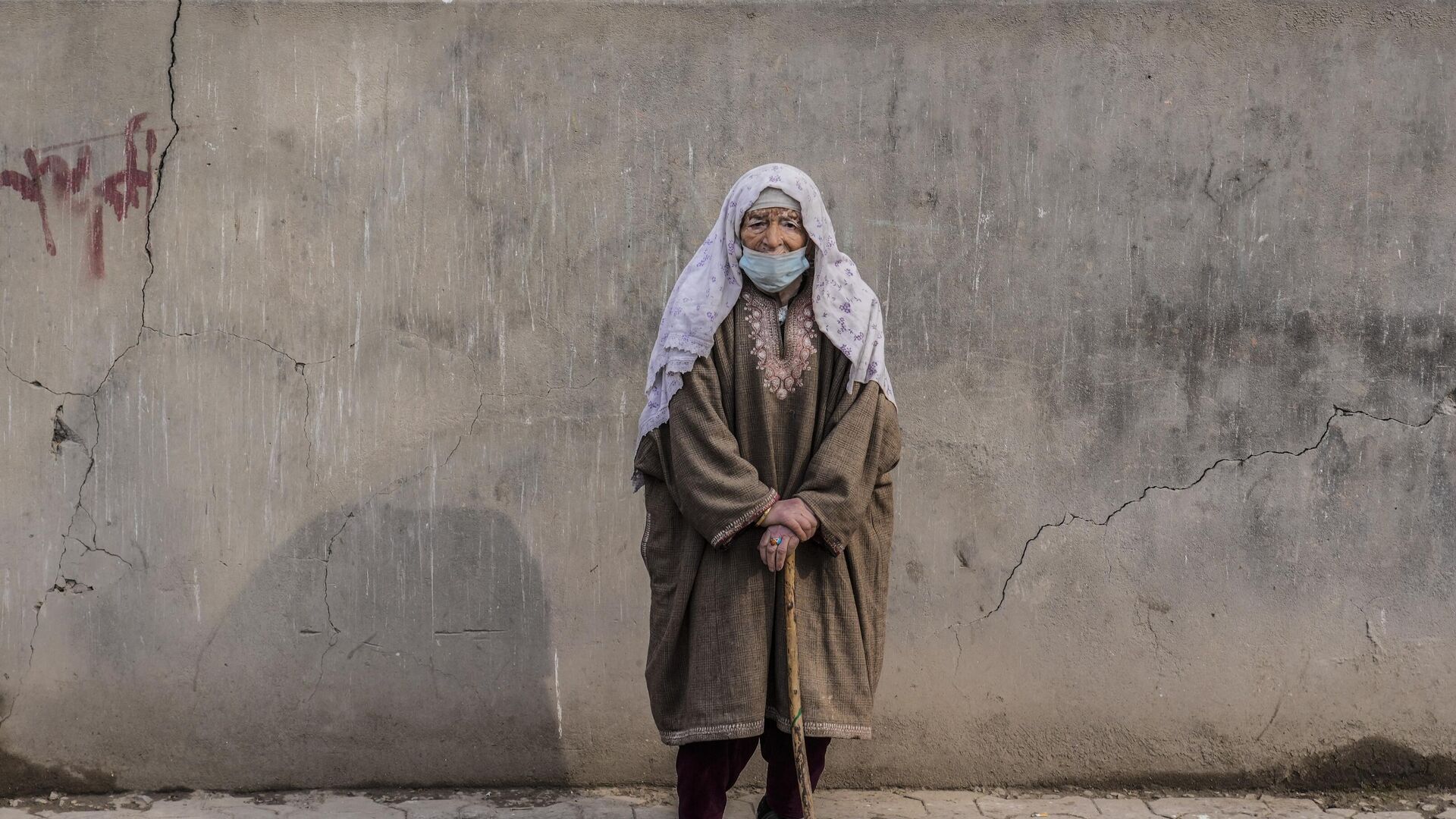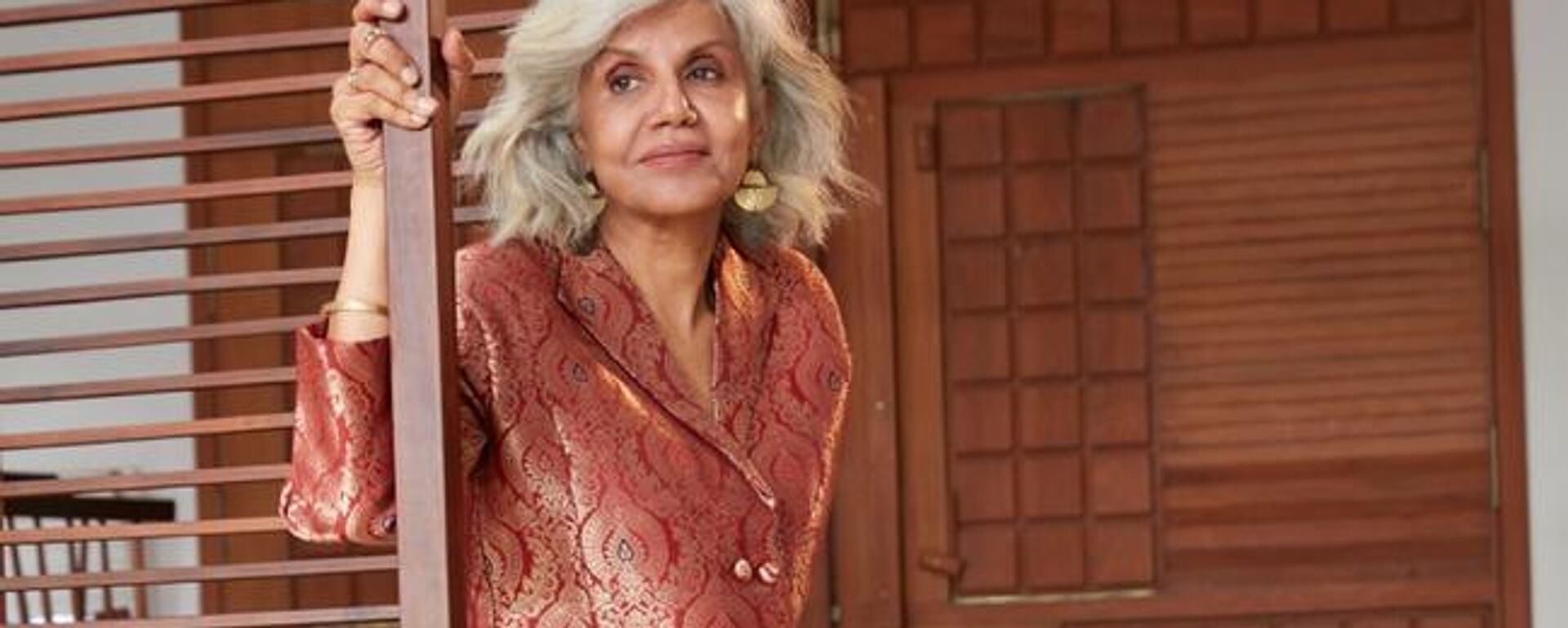https://sputniknews.in/20230615/eternal-caregivers-elderly-women-in-india-feel-invisible-because-of-social-conditioning-2489570.html
Eternal Caregivers: Elderly Women in India Feel Invisible Because of Social Conditioning
Eternal Caregivers: Elderly Women in India Feel Invisible Because of Social Conditioning
Sputnik India
The UN General Assembly officially recognised World Elder Abuse Awareness Day on 15 June 2011 with the aim of promoting understanding of the importance of... 15.06.2023, Sputnik India
2023-06-15T14:29+0530
2023-06-15T14:29+0530
2023-06-22T16:06+0530
india
delhi
new delhi
the united nations (un)
ageism
women empowerment
domestic abuse
human rights
human rights violations
caste system
https://cdn1.img.sputniknews.in/img/07e7/06/0f/2498860_0:0:3226:1816_1920x0_80_0_0_c3aee8198309e903a1d99b3dd2764d30.jpg
On the eve of World Elder Abuse Awareness Day, HelpAge India launched a national report on “Women & Ageing: Invisible or Empowered”. The report focuses on older women, who are often last in line, where their rights are concerned.The main reasons behind the abuse were cited as lack of awareness on redressal mechanisms (56 per cent).The event was attended by famous Bollywood actress Sharmila Tagore, several social activists and people from various sections of the society.Sputnik talked to Rumjhum Chatterjee, vice chairperson of HelpAge India, about the reasons behind elderly women being invisible, how they can be given importance in the family, reasons behind the increase in abuse of the elderly, and initiatives of the NGO.Social Conditioning in India's SocietySputnik: What reasons do you see behind women becoming invisible as they get older?Rumjhum Chatterjee: The first and foremost reason behind this is social conditioning. However, it is changing now. We can see differences from generation to generation. So the people who we are referring to as the elderly women are, let us say, my grandmother, my mother, etc, have been brought up and the social conditions were such that they were always taught in their upbringing to be ever giving eternal caregivers etc. and think about yourself last.This was even reiterated by Sharmila Tagore, as she said that if that is the way that the family system has been conditioned, then suddenly when the children have grown up, you turn around and say 'no I don't want to be so invisible and I am now supposed to be the centre of all your attention and care'. It doesn't happen automatically.This was even discussed during the panel discussion and Prof. Pinky Mathur Anurag (director of the Centre for Human Rights Studies at OP Jindal Global University) very well kept her point as she said that we have to divide the responsibilities at home. So now when she ages she will be a very different woman than let’s say her grandmother.Sputnik: What do you think should be done to make the elderly feel like they are not last in line or being neglected?Rumjhum Chatterjee: We have to give them the priority in the family first, then society has to accept it and finally demonstrate through action. We have to understand that what will give women an identity in their old age, may be economic independence. So, we have to understand what are those opportunities that we are creating which can give them some income during their old age, which is what they can proudly claim as having earned.Sputnik: The national report on "Women & Ageing: Invisible or Empowered" shows that abuse against older women has increased. What are the reasons behind this spike and how can this be controlled?So, if they get addressed, they are spoken about and will get written about. So, you see that it is increasing. But that is not to say that it wasn't there earlier.While I talk about controlling the abuse against elderly, I have a point to make about the Maintenance and Welfare of Parents and Senior Citizens Act, 2007. We blame the elderly for not being aware about the act. It is for maintenance of parents and senior citizens, but we are not talking to the stakeholders.So we should know that there is something like that which has been created to protect the elderly. If we are neglecting our parents then we have recourse to the law. Elderly might not be knowing about it but then how many of the children or the next generation know about it and how have they made the elderly aware about it.Sputnik: A lot is being done by the civil society, NGOs, as well as the government, but still elderly abuse is one of the issues which have not been addressed effectively. What more efforts do you think are needed?Rumjhum Chatterjee: I think we have to do a lot more. Well, I think that the government can step in. Prof. Pinky Mathur Anurag has been very vocal about it. It's not enough to just have a law or a policy that they have announced in 2007 and in 2023, we are talking about it and saying that if you have any issues about that act we can tweak it.Everybody is today talking of inclusion but you don't single out. When you talk about inclusion, you talk about women but you don’t talk about the elderly. Therefore, if you want to prevent elderly abuse, then their inclusion is required and the government should become more proactive.Sputnik: In 2019, HelpAge India launched the app Save Our Seniors (SOS). In four years, how many complaints have been received and what steps does HelpAge India take to solve the complaints?Rumjhum Chatterjee: Generally, we used to get around 10-12 calls per day. Now, as part of the action that we've taken on those complaints the government of India in 2021 took over it as a national helpline for elderly and senior citizens, the number is 14567. It is basically funded and initiated by Ministry of Social Justice and Empowerment.HelpAge India is one of the largest partners implementing it in eight states. So, through 14567, we receive close to 100-250 calls per day.It is a typical call centre where call lands and then a district level field response officer to whom the call is diverted. They then take the required action. For example, if a senior citizen has complained about abuse they connect them to the relevant department. Similarly, if they need health services then that are provided to them.So, this is now live across the country and has been running for the last two years. So this has been the evolution from SOS to national helpline number.Sputnik: What message would you give to the elderly as well as youth on the occasion of World Elder Abuse Day?Rumjhum Chatterjee: To the elderly, I will request that they should speak up. We need to hear from them. I think there are enough ways in which help can be provided. They just need to speak up, and shouldn’t be suppressed by others.
https://sputniknews.in/20230403/60-year-old-indian-model-defies-age-breaking-barriers-by-rediscovering-new-passion-1406298.html
https://sputniknews.in/20230521/madhya-pradesh-becomes-first-state-to-offer-air-travel-facility-to-senior-citizens-for-pilgrimage-2081259.html
india
delhi
new delhi
rural india
Sputnik India
feedback.hindi@sputniknews.com
+74956456601
MIA „Rossiya Segodnya“
2023
Rahul Trivedi
https://cdn1.img.sputniknews.in/img/07e6/0c/13/136500_0:0:628:627_100x100_80_0_0_72097ff894c7446b70d2efafcb719720.jpg
Rahul Trivedi
https://cdn1.img.sputniknews.in/img/07e6/0c/13/136500_0:0:628:627_100x100_80_0_0_72097ff894c7446b70d2efafcb719720.jpg
News
en_IN
Sputnik India
feedback.hindi@sputniknews.com
+74956456601
MIA „Rossiya Segodnya“
Sputnik India
feedback.hindi@sputniknews.com
+74956456601
MIA „Rossiya Segodnya“
Rahul Trivedi
https://cdn1.img.sputniknews.in/img/07e6/0c/13/136500_0:0:628:627_100x100_80_0_0_72097ff894c7446b70d2efafcb719720.jpg
world elder abuse awareness day, abuse against women, helpage india, violence against senior citizens, women & ageing: invisible or empowered, redressal of abuse against senior citizens, crime against senior citizens, helpline number, national helpline number, maintenance and welfare of parents and senior citizens act, 2007, ministry of social justice and empowerment
world elder abuse awareness day, abuse against women, helpage india, violence against senior citizens, women & ageing: invisible or empowered, redressal of abuse against senior citizens, crime against senior citizens, helpline number, national helpline number, maintenance and welfare of parents and senior citizens act, 2007, ministry of social justice and empowerment
Eternal Caregivers: Elderly Women in India Feel Invisible Because of Social Conditioning
14:29 15.06.2023 (Updated: 16:06 22.06.2023) The UN General Assembly officially recognised World Elder Abuse Awareness Day on 15 June 2011 with the aim of promoting understanding of the importance of preventing elder abuse and supporting the rights and well-being of older people.
On the eve of World Elder Abuse Awareness Day, HelpAge India launched a national report on “Women & Ageing: Invisible or Empowered”. The report focuses on older women, who are often last in line, where their rights are concerned.
The report revealed that abuse against older women is on the rise at 16 per cent. The abuse includes physical violence (50 per cent), disrespect (46 per cent) and emotional or psychological abuse (40 per cent). The main perpetrators were recognised as the son (40 per cent), followed by other relatives (31 per cent) and daughter-in-law (27 per cent).
The main reasons behind the abuse were cited as lack of awareness on redressal mechanisms (56 per cent).
The event was attended by famous Bollywood actress Sharmila Tagore, several social activists and people from various sections of the society.
Sputnik talked to Rumjhum Chatterjee, vice chairperson of HelpAge India, about the reasons behind elderly women being invisible, how they can be given importance in the family, reasons behind the increase in abuse of the elderly, and initiatives of the NGO.
Social Conditioning in India's Society
Sputnik: What reasons do you see behind women becoming invisible as they get older?
Rumjhum Chatterjee: The first and foremost reason behind this is social conditioning. However, it is changing now. We can see differences from generation to generation. So the people who we are referring to as the elderly women are, let us say, my grandmother, my mother, etc, have been brought up and the social conditions were such that they were always taught in their upbringing to be
ever giving eternal caregivers etc. and think about yourself last.
This was even reiterated by Sharmila Tagore, as she said that if that is the way that the family system has been conditioned, then suddenly when the children have grown up, you turn around and say 'no I don't want to be so invisible and I am now supposed to be the centre of all your attention and care'. It doesn't happen automatically.
This was even discussed during the panel discussion and Prof. Pinky Mathur Anurag (director of the Centre for Human Rights Studies at OP Jindal Global University) very well kept her point as she said that we have to divide the responsibilities at home. So now when she ages she will be a very different woman than let’s say her grandmother.
Apart from this, as discussed during the panel discussion that lack of education, skills and knowledge are also some of the reasons because education of women was not the priority of the parents, they were not allowed to go out and work. It was always the son who had to be taken care of. In rural areas, still many girls drop out after grade five. Therefore, the conclusion remains the same that it is all about social conditioning.
Sputnik: What do you think should be done to make the elderly feel like they are not last in line or being neglected?
Rumjhum Chatterjee: We have to give them the priority in the family first, then society has to accept it and finally demonstrate through action. We have to understand that what will give women an identity in their old age, may be
economic independence. So, we have to understand what are those opportunities that we are creating which can give them some income during their old age, which is what they can proudly claim as having earned.
Sputnik: The national report on "Women & Ageing: Invisible or Empowered" shows that abuse against older women has increased. What are the reasons behind this spike and how can this be controlled?
Rumjhum Chatterjee: You're seeing a spike today because more people are coming out talking about it. It is not that incidents have risen. They were always there but never spoken about. Now, because we have the helpline, we know that we've given an option to the elderly women to reach out in case they need help. So, they are reaching out to that. There never was an opportunity earlier.
So, if they get addressed, they are spoken about and will get written about. So, you see that it is increasing. But that is not to say that it wasn't there earlier.
While I talk about controlling the abuse against elderly, I have a point to make about the Maintenance and Welfare of Parents and Senior Citizens Act, 2007. We blame the elderly for not being aware about the act. It is for maintenance of parents and senior citizens, but we are not talking to the stakeholders.
So we should know that there is something like that which has been created to protect the elderly. If we are neglecting our parents then we have recourse to the law. Elderly might not be knowing about it but then how many of the children or the next generation know about it and how have they made the elderly aware about it.
Sputnik: A lot is being done by the civil society, NGOs, as well as the government, but still elderly abuse is one of the issues which have not been addressed effectively. What more efforts do you think are needed?
Rumjhum Chatterjee: I think we have to do a lot more. Well, I think that the government can step in. Prof. Pinky Mathur Anurag has been very vocal about it. It's not enough to just have a law or a policy that they have announced in 2007 and in 2023, we are talking about it and saying that if you have any issues about that act we can tweak it.
Does it take that long for one to react to any piece of legislation that you put out? I find that very strange. The government should be more proactive. But that will happen when we put the elderly into the inclusion agenda.
Everybody is today talking of inclusion but you don't single out. When you talk about inclusion, you talk about women but you don’t talk about the elderly. Therefore, if you want to prevent elderly abuse, then their inclusion is required and the government should become more proactive.
Sputnik: In 2019, HelpAge India launched the app Save Our Seniors (SOS). In four years, how many complaints have been received and what steps does HelpAge India take to solve the complaints?
Rumjhum Chatterjee: Generally, we used to get around 10-12 calls per day. Now, as part of the action that we've taken on those complaints the government of India in 2021 took over it as a national helpline for elderly and senior citizens, the number is 14567. It is basically funded and initiated by Ministry of Social Justice and Empowerment.
HelpAge India is one of the largest partners implementing it in eight states. So, through 14567, we receive close to 100-250 calls per day.
It is a typical call centre where call lands and then a district level field response officer to whom the call is diverted. They then take the required action. For example, if a senior citizen has complained about abuse they connect them to the relevant department. Similarly, if they need health services then that are provided to them.
So, this is now live across the country and has been running for the last two years. So this has been the evolution from SOS to national helpline number.
Sputnik: What message would you give to the elderly as well as youth on the occasion of World Elder Abuse Day?
Rumjhum Chatterjee: To the elderly, I will request that they should speak up. We need to hear from them. I think there are enough ways in which help can be provided. They just need to speak up, and shouldn’t be suppressed by others.
Whereas for the youth, I would say that respect elders as we have been taught and change your mindset that they are not a burden rather by respecting them you are reciprocating the love that you have received from them. They have sacrificed their lives for which it takes very little to give back.




